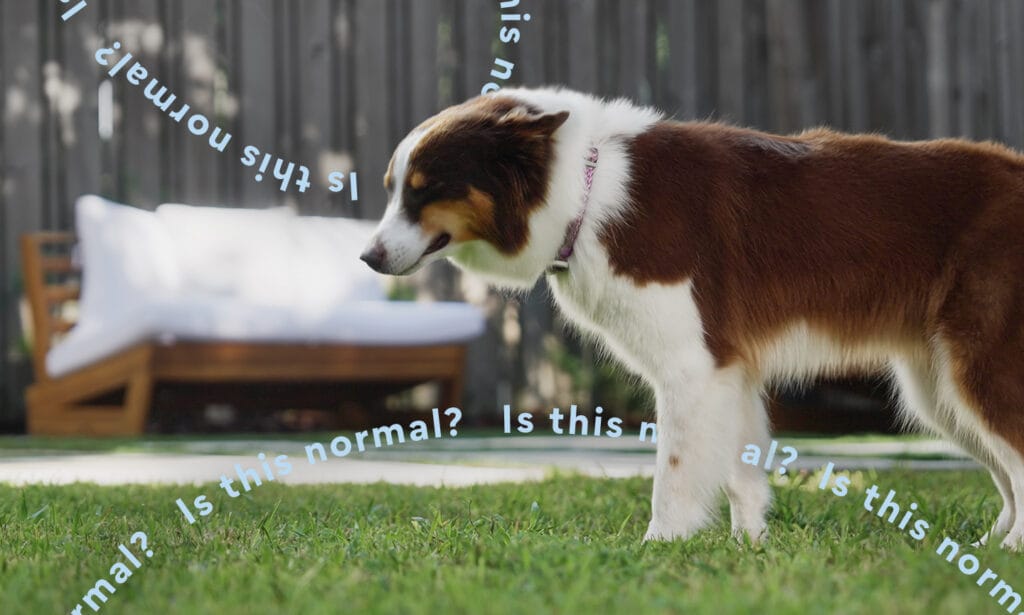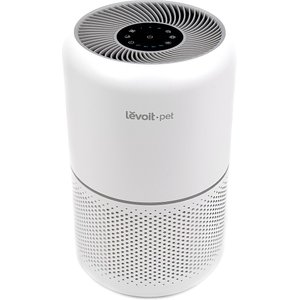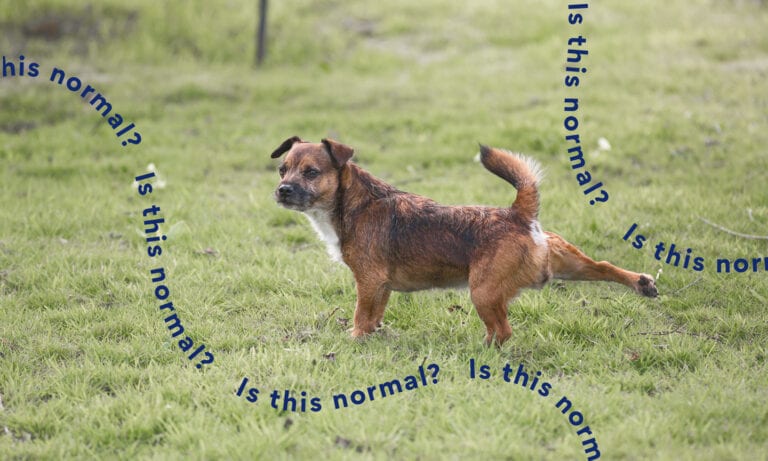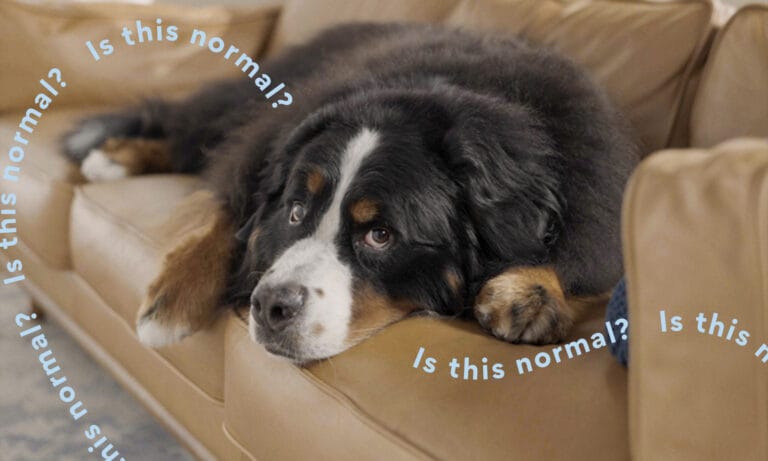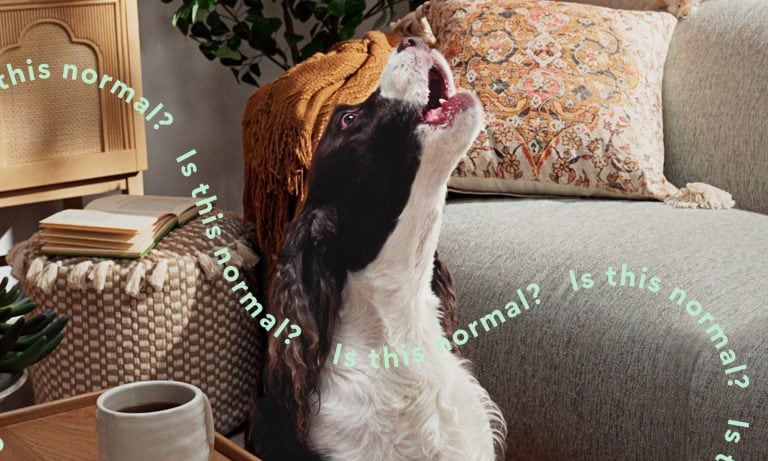Q: I notice that my dog will make loud snorting or honking sounds from time to time, almost as if something is irritating the back of his throat. It sounds kind of like what a backward sneeze would sound like, but it is deeper and more guttural. Is this normal? Should I be concerned?
A: You were onto something when you mentioned “sneeze.” What you hear your dog doing is actually called reverse sneezing, and can happen for a number of reasons, including environmental irritants. Although it can be startling, rest assured reverse sneezing in dogs is harmless and pretty common—most dogs will experience reverse sneezing during their lifetime.
What is reverse sneezing in dogs?
Reverse sneezing, known more formally as pharyngeal gag reflex and paroxysmal respiration, is exactly what it sounds like it is, says Dr. Kelly Diehl, DVM, MS, senior director of science communications at Morris Animal Foundation based in Denver, Colorado.
Unlike a regular sneeze, a reverse sneeze pulls in air quickly with force instead of expelling air out. It usually doesn’t last longer than a minute. “Dogs can make odd sounds during an episode of reverse sneezing, and, for many dog owners, it can be scary watching a dog reverse sneezing,” Dr. Diehl says.
The good news? The act of reverse sneezing isn’t harmful to the dog.
“While it can be quite concerning for pet parents seeing it for the first time, reverse sneezing usually isn't serious and is quite common,” says Dr. Kristan Riley, DVM, a Heal House Call Veterinarian vet in North Carolina specializing in hospice care for pets.
However, it’s important not to confuse reverse sneezing with coughing or choking, as these are considered emergencies and require immediate attention.
Are certain dog breeds more prone to reverse sneezing?
The jury's still out on this one. "It's a bit controversial among veterinarians when it comes to which breeds are more likely to reverse sneeze, which can be confusing for owners," Dr. Diehl says.
She goes on to share that some vets think that small breed dogs, including brachycephalic breeds (also known as breeds with "smushed faces") such as Pugs and Bulldogs, are more commonly affected. Meanwhile, other experts believe it happens more often in dogs with longer noses.
"The best advice I can give is that I've seen it in all breeds of dogs, so I tend to stay away from talking about breed differences when it comes to reverse sneezing," Dr. Diehl says.
What does reverse sneezing in dogs sound like?
Reverse sneezing often sounds like a honking sound or a loud snorting sound.
"The most common sound I've heard in practice and witnessed in my own dog is more like a combination snorting or snorkeling sound that also has an element of deep noise that sounds as though something is caught in the throat," Dr. Diehl says.
These snorting or honking noises may come in rapid succession, Dr. Riley adds.
Besides these specific sounds, you might also notice your dog extending their head and neck out when having an episode of reverse sneezing.
What causes reverse sneezing in dogs?
Just like human sneezes, reverse sneezing in dogs can happen for various reasons. This may include:
Environmental irritants
Experts explain that reverse sneezing may happen when the dog’s soft palate or throat becomes irritated due to any of the following:
- Allergies
- Foreign bodies
- Perfume
- Air fresheners
- Smoke
- Pollen
- Grass awns
- Dust
Nasal mites
Another culprit that can cause reverse sneezing? Nasal mites, which are microscopic parasites that live in the dog’s nasal and sinus cavities. Passed from dog to dog, nasal mites can cause reverse sneezing, itchiness and nasal discharge, among other symptoms.
“Nasal mites are a common cause that probably often goes undiagnosed in dogs,” says Dr. Diehl.
Nasal tumors or abnormal conformation of the upper airways
Although rare, Dr. Diehl points out that something more serious, such as a growth in the nasal passage, might be the cause of your dog’s reverse sneezing.
Another cause could be abnormal conformation of the upper airways, more commonly seen in brachycephalic breeds, like the ones mentioned above.
If your vet suspects either of these may be the case, they'll likely recommend diagnostic tests, such as x-rays, a CT scan or a rhinoscopy, which is an examination of the nasal passages and sinus cavities using a thin, tubelike tool.
How to Stop Reverse Sneezing in Dogs
Experts agree that most cases of reverse sneezing resolve quickly and on their own, but here are some things you can do for your pooch during a reverse sneezing episode:
- Comfort the dog
- Stroke the dog’s throat
- Cover the dog’s nostrils for just a few seconds to stimulate swallowing
- Move the dog to an area of fresh air
Air purifiers can help filter the air from common irritants, like smoke, pollen and dust.
Medication
If your vet thinks allergies or nasal mites are causing reverse sneezing, they may prescribe a medication, such as decongestants, antihistamines or anti-inflammatories.
“Vets might also recommend further diagnostics to nail down the allergen,” says Dr. Diehl.
Learn more about different allergies in dogs and how they are typically treated.
Surgery, radiation or chemotherapy
In the small chance your vet confirms that your dog has a tumor, surgery or radiation may be needed.
“It depends on the tumor type, but surgery, radiation and sometimes, rarely, chemotherapy are used to treat these tumors,” explains Dr. Diehl.
For dogs who have upper airway abnormalities, either because they were born with it or due to trauma, surgery may be recommended, although Dr. Diehl is quick to point out that some conformation problems don't require intervention.
"Each dog is different and your veterinarian can guide you on whether surgery is indicated or not," she says.
When should you contact a vet?
Take your dog to the vet for a checkup if:
- Your dog is suddenly reverse sneezing more often
- The reverse sneezing episode lasts more than one minute
- You have multiple dogs in your household who begin to reverse sneeze more frequently at the same time. “This could point to an environmental problem or nasal mites, which are passed dog to dog,” Dr. Diehl explains.
Dr. Diehl recommends taking a video of your dog during an episode to show your vet, as this could be of help. And remember, if your dog’s reverse sneezing is accompanied by choking, coughing, trouble breathing, or nasal discharge, you should get in touch with your vet ASAP.
Learn more about weird dog behavior:
Share:
